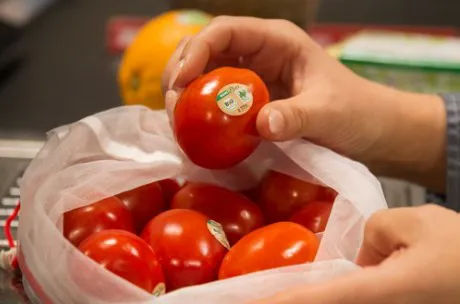Eight out of ten customers would readily dispense with disposable packaging when purchasing food, certainly regarding fruits and vegetables. REWE checked this in the largest packaging related test in Germany: in about 630 REWE and nahkauf markets in Baden-Württemberg, the Palatinate and the Saarland.
Organic fruit and vegetables are offered without any plastic packaging, or these products are being offered in more environmentally friendly packaging. The annual savings potential is 90,000 kilograms of packaging material, of which up to 60,000 kilograms would be plastic. REWE is doing pioneering work with this pilot. The retailer is to gather important experience on the way to wide-ranging plastic cutting in its fruit and vegetable assortment.
'Intensify environmental engagement'
"In view of the global extent of environmental pollution and plastic waste, we as food retailers are also responsible for counteracting and intensifying our commitment to the environment," says Peter Maly, who is responsible for sales at REWE for more than 3,300 REWE stores nationwide.
"The focus is on solutions that make packaging unnecessary, but also a more economical use of materials and the development of innovative, greener packaging alternatives are looked at. At the same time we want to make it easy for our customers to do something for the environment. That's why our test is so important, and the results and insights it will provide, will guide us through the next phases." REWE has set itself the goal of making all private label packaging environmentally friendly by the end of 2030.

NABU Federal Managing Director Leif Miller is pleased with the initiative: "NABU welcomes the test as a further step in avoiding plastic packaging in supermarkets. In Germany, we still consume more than 220 kilograms of packaging per capita per year. We need solutions to minimise the use of all kinds of materials, including glass, paper and aluminum, so we are delighted about this environmentally friendly step by REWE."
The test will include 107 organic fruits and vegetables. Not all of them are unpackaged. As plastic packaging primarily helps to ensure the freshness, quality and hygiene of the product along the entire value chain, the large-scale trial will continue to protect, for example, some highly sensitive soft fruits and fresh leafy salads such as lamb's lettuce or rocket. And of course products like potatoes and onions, which can not be individually labeled to ensure them being distinct from conventional goods, cannot initially be offered completely unpackaged.
In such cases, the most environmentally friendly labeling and packaging solutions are used. Then there will be an evaluation of how the respective measures have affected freshness and shelf life, how practicable they are and whether they are accepted by the customer.
"Avoid, reduce, improve"
The REWE Group has already successively made 1,112 private-label packaging products more environmentally friendly, in line with their motto "avoid, reduce, improve". As a result of these measures, around 7,000 tons fewer plastic is used each year. Examples include the year-round "natural branding" of organic sweet potatoes, the reduction of film thicknesses and the switch from film packaging to adhesive tapes and labels.
In addition to all this, grass paper or certified paper is used for boxes for packaged fruit or recyclate for plastic bottles for cleaning, washing and cleaning agents. With reusable nets as an alternative to the plastic bag, REWE appeals to customers to increasingly resort to loose fruit and vegetables. And then there are stainless steel drinking straws as a replacement for disposable plastic straws, as well as cotton swabs with a shaft made of paper instead of plastic, all available at REWE.
By promoting reusable alternatives, alternative raw materials and secondary raw materials, reducing packaging material and using recyclable plastic and switching to 100 percent certified paper packaging, the REWE Group aims to continuously reduce the environmental impact of its packaging.
For more information: www.rewe.de
